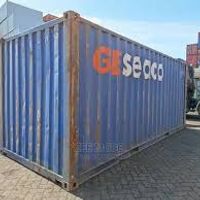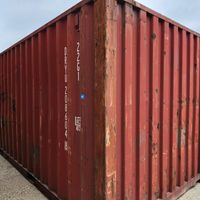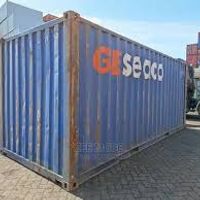A container farm is a sustainable and cost-effective agricultural solution, allowing farmers to grow produce all year round in almost any location. Learn how to expand your modification business into building container farms from scratch, plus buy units at the best prices.
Shipping container farms have a long list of benefits; they’re scalable, can be placed in remote or urban locations, and are customizable to the farmer’s unique needs and preferences.
The market for container farms has been growing steadily in recent years. So if you’re in the container modification business and want to expand into container farm building—this is surely a smart business move.
However, as a modification company, you are likely to encounter two problems—sourcing suitable containers for your projects from reliable suppliers, and getting a price that suits your budget.
Luckily, we solve both of these issues. We’re Container xChange, the largest global container marketplace, where you can choose from 100,000+ containers in 2,500+ locations worldwide. Work with only vetted sellers, and negotiate prices directly with them.
Explore our public search to browse and compare offers for yourself in your preferred location, today!
10,362 results found on the platform.
Container prices start from $350/unit.
Currently no match for your search
Change your search criteria or fill out the form below to get notified via email when there is a new match for you on xChange!
-
Pick-up
20DC (Cargo worthy)
37 units available
YOM:
Year of manufacture:
2004
2010
Savannah, GA
per container
Non-negotiable price$
925
-
Pick-up
40HC (Cargo worthy)
2 units available
YOM:
Year of manufacture:
2004
2010
Los Angeles, CA
per container
Non-negotiable price$
1625
-
Pick-up
40HC (Cargo worthy)
4 units available
YOM:
Year of manufacture:
2004
2010
Los Angeles, CA
per container
Non-negotiable price$
1650
Showing 3 of 10,362 results
Load more()
YOM:
Year of manufacture:
per container
$
What is container farming?
Container farming involves using brand new shipping containers as well as cargo-worthy, to grow plants, herbs, and other agricultural produce. These containers are fitted with special equipment to create a controlled environment.
This includes ventilation, lighting, irrigation, and hydroponic or aeroponic systems, depending on the type of crops being grown.
Benefits of container farms
Modular farms are a smart and efficient way to grow plants. Here are some of the main benefits of using containers for farming.
Sustainability and environmental benefits
In a world where environmentally friendly practices are gaining more importance than ever, container farms are a fresh addition to the sustainable offerings —which can also save farmers a lot of money.
Water efficient: Container farming uses up to 90% less water than traditional farming methods. This is because container farms often use an aeroponic or hydroponics system, which circulates water and minimizes wastage.
Reduced food miles: Container farms can be placed anywhere due to their compact nature. By growing food nearer to consumers, such as in urban settings, farmers cut down on transportation costs and lower their carbon emissions.
Pesticide-free: As containers provide enclosed environments, it’s easier to control pests and avoid using harmful pesticides on produce.
Space efficiency and scalability
Shipping containers come in various shipping container sizes including 10ft, 20ft, and 40ft. However, even larger containers are significantly smaller than traditional crop sites. Due to their compact nature, container farms can be placed in areas with limited ground space.
It’s also possible to modify these containers by stacking them on top of one another to create vertical farms or joining units to create larger enclosed spaces.
Year-round production and controlled environment
Unlike traditional farming, container farming isn’t dependent on weather, and production can remain consistent throughout the year. This means a steady yield, which, in turn, equals steadier profits.
Besides this, container farm crops are more resilient to climate change than traditional farm crops, as they can grow with stable temperatures, humidity and light levels, despite external changes.
How can container modification businesses contribute to sustainable farming solutions?
Container farms play a crucial role in urban areas where traditional farm space is limited. Demand for compact facilities for crops is on the rise in many parts of the world, especially in the US, as the need for local, fresh produce continues to grow.
- Container farms help to address food security concerns by providing resilient, climate-controlled environments to grow plants, unaffected by external weather events.
- These farms also help to mitigate environmental impacts by using less water, reducing carbon emissions, and utilizing fewer pesticides.
- Modular farms are also ideal for areas affected by climate change and resource scarcity, ensuring a more sustainable and reliable food supply to locals and preventing shortages, which can lead to famine.
If you’re in the shipping container modifications industry and want to branch out into new projects, consider starting with container farms.
As a supplier of container farms, your business will help farmers make fresh produce available at lower costs while using fewer resources. It’s a win-win!
Container farming cost: Container and conversion costs
To plan for your container farm conversion projects, you’ll need to know the cost of the container types and sizes you’ll buy for conversions. In general, standard dry containers work best for this type of modification.
Here are the prices for the three most popular container sizes.
10ft shipping container
A 10ft container is ideal for a very small farm. This container size will take up minimal space and is quick and easy to move around.
A brand new 10ft unit in the US will cost you $3,979 on the xChange platform, and a cargo-worthy container, $3,000.
20ft shipping container
The 20ft container offers more volume and is perfect for larger crops or a wider variety of plants.
You can buy a brand new 20ft container in the US for $2,170 on xChange and a cargo-worthy one for just $1,361.
40ft shipping container
The 40ft dry container has double the volume of the 20ft but is usually only 20-30% more expensive.
Get a brand new 40ft on our platform for $3,530 and a cargo-worthy one for just $1,565.
What are the costs of converting a container into a farm?
Now that you know what both brand new and cargo-worthy standard containers cost, here’s a rough breakdown of some of the main costs involved in converting a container into a farm, excluding the cost of the container.
- Structural modifications: $1,500 to $4,500
- Installing electrical system: $2,500 to $6,500
- Plumbing: $2,000 to $5,000
- Insulation: $2,000 to $5,000
- Climate control measures: $2,800 to $7,500
- Installing grow systems: $3,500 to $10,000
- Safety features: $750 to $1,700
Overall total estimate:
Low-end estimate: $15,550
High-end estimate: $40,200
Converting containers into farms can be expensive; that’s why you must get container deals within your budget. Click below to secure the best deals for your business today.
How to convert a container into a farm
Not sure about the steps for creating a container farm? Here’s a basic overview of the conversion process.
Client consultation and container selection
First, consult with your client to understand their specific farming needs. This will include the types of crops they want to grow and the farming method they’re using (hydroponics, aquaponics, soil-based).
Once you have the client’s criteria in mind, you can design the layout of the container farm and decide on the container size you’ll need to purchase.
Sourcing containers for conversion
Now that you have all the information, you’ll need to source the containers from a safe and reliable place, at a price that suits your budget. Using a platform like Container xChange will ensure you get the best deals, all while protecting your business from scams at the same time.
Structural modifications
Once you’ve received the containers, it’s time to get to work. First, you’ll need to insulate the container to ensure temperature stability. Next, weather-proof it, and add doors and windows for ventilation and natural light. You may also have to repaint the unit to your client’s preference.
Electrical systems, plumbing, and climate control
Once all the structural changes have been finalized, add appropriate electrical and plumbing systems.
The electrical system you choose should be robust enough to power grow lights, HVAC (Heating, Ventilation, and Air Conditioning) systems, and pumps. Make sure you install LED grow lights so all plants get equal light coverage within the unit.
Plumbing should be set up to facilitate water supply and drainage, as well as aquaponic and hydroponic systems if required.
You’ll also need humidifiers and dehumidifiers to control the humidity levels within the container.
Grow systems
Depending on the client’s preference, you may need to set up hydroponic, aquaponic, or soil-based grow systems. This will include installing grow beds, water tanks, pumps, and nutrient delivery systems.
Automation
Automating the lighting, irrigation, and climate control within the unit will help to streamline operations for your customer. You can also install sensors to monitor temperature, humidity, and light levels on-site and remotely.
Safety features
To ensure the safety of your customer, the container farm should be equipped with a fire extinguisher, a smoke detector, and a first aid kit.
Once all of these features have been installed, it’s important to do a final inspection to test that everything is working as it should before handing it over to the customer.
Get units for your next shipping container farm project in 4 easy steps
Ready to source shipping containers for your next farm conversion project quickly and easily? With xChange, it’s finally possible to find the containers you need for your projects in just 4 simple steps.
Browse and compare offers
Start by typing in the container type and location to see available offers that match your criteria. You’ll be able to see the price, container condition, and information about the seller in the search results.
Here you can browse and compare multiple options at the same time to find the perfect match.
Negotiate the best wholesale prices
When a good offer catches your attention, simply contact the supplier directly to negotiate the final price and any other details you’d like to confirm. Best of all, there are no middlemen involved; you’ll save time and avoid added commissions.
Make secure payments
When the deal is finalized, pay for your containers on the platform using our secure payment feature. All payments are encrypted to add an extra layer of security to transactions.
Check the container quality
Once you receive your containers, you’ll have a 7-day window to inspect them and make sure you’re happy with the quality. If not, we’ll help you liaise with the customer, and you can either swap the units or get your money back.
Buy containers for container farms at the best prices
If you’re regularly sourcing containers for modification projects, Container xChange is the partner you’ve been looking for. Finally, rest easy knowing you’re buying quality containers at prices you’re comfortable with.
Here are some more benefits of subscribing to the xChange marketplace:

Want to know how other businesses use xChange to enhance their business operations? Andes Valencia, CEO of E-Containers, has this to say about using our trading platform:
“Doing business on xChange promotes fairness; buyers are protected, and sellers strive to deliver as promised.”
Want to join 1,700+ successful businesses on xChange, cut out the middleman, and start saving money by buying directly from suppliers? Click below to schedule your free demo today. You’ll get the chance to see our platform live in action and learn how our marketplace can help you get the best deals for all of your container farm modifications.
What is a container farm?
A container farm is an innovative agricultural solution where plants are grown inside shipping containers. For this to be possible, the correct ventilation, lighting, and irrigation systems are needed, depending on the type of plants being grown.
How do you set up a container farm?
Setting up a container farm involves purchasing brand new or cargo-worthy containers, selecting an appropriate site, adding insulation, lighting, ventilation, and monitoring systems, and planting the crops.
How do container farms work?
Container farms are repurposed shipping containers equipped with ventilation systems, lighting, insulation, automation, and monitoring systems to make sure that conditions inside the unit are optimal for crops to grow.










